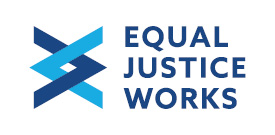By Samantha Farish, 2019 Equal Justice Works Fellow

Blog Originally Posted on EqualJusticeWorks.org. Reposted with Permission.
As an Equal Justice Works Fellow hosted by The Veterans Consortium, I work closely with veterans every single day. I assist veterans who have appealed a denial by the Board of Veterans Appeals (Board) to the Court of Appeals for Veterans Claims (CAVC). Often, CAVC agrees with the veteran that the Board made a mistake in their decision, but will remand the claim—meaning it is sent back to the Board for reconsideration. My job is to help these veterans put an end to their fight.
When I first started working with veterans as a Fellow in the Equal Justice Works AmeriCorps Veterans Legal Corps, I found it all a bit intimidating. Even though my parents both served in the U.S. Navy, I would often worry that I would say the wrong thing to a veteran or reveal ignorance about their military experience. Now, having worked with veterans for the last two years, I’ve learned some valuable lessons that I’m applying to my Equal Justice Works Fellowship at The Veterans Consortium. Here’s what you need to know when it comes to working with our servicemen and women.
Lesson 1: Military culture often makes it difficult for veterans to seek the help they need
The stigma that goes along with seeking help can prevent servicemembers and veterans from making their health a priority. Keep this in mind when the Department of Veterans Affairs (VA) denies a claim simply because the veteran failed to receive treatment until later in life.
Lesson 2: Sometimes clients don’t consider themselves veterans
You may meet individuals who served in the military, but due to a less-than-honorable discharge, they have less access to veterans’ benefits. Their discharge status can cause men and women who served to not always identify as veterans.
Lesson 3: Listening matters
When you meet veterans at a legal clinic, you may either not be able to provide the specific expertise that they need, or they might not have a discrete legal issue that you can assist. Still, taking time out of your day to listen to their stories can make a difference.
Lesson 4: They often have ample experience with the claims system
There is a term describing the VA claims process: “hamster wheel.” It is meant to evoke the constant cycle of delays, appeals, and remands that veterans go through. The result is that by the time you take their case, they have become experts on the system in their own way.
Lesson 5: Never, ever assume
You may have experience or knowledge that informs your image of what the military was like, but refrain from asking pointed questions or making assumptions. Instead, ask them to tell you their story in their own words.
At Equal Justice Works, we are proud of Samantha’s contributions to protecting veterans’ rights. To learn more about Samantha’s Fellowship, visit her Fellow profile.
